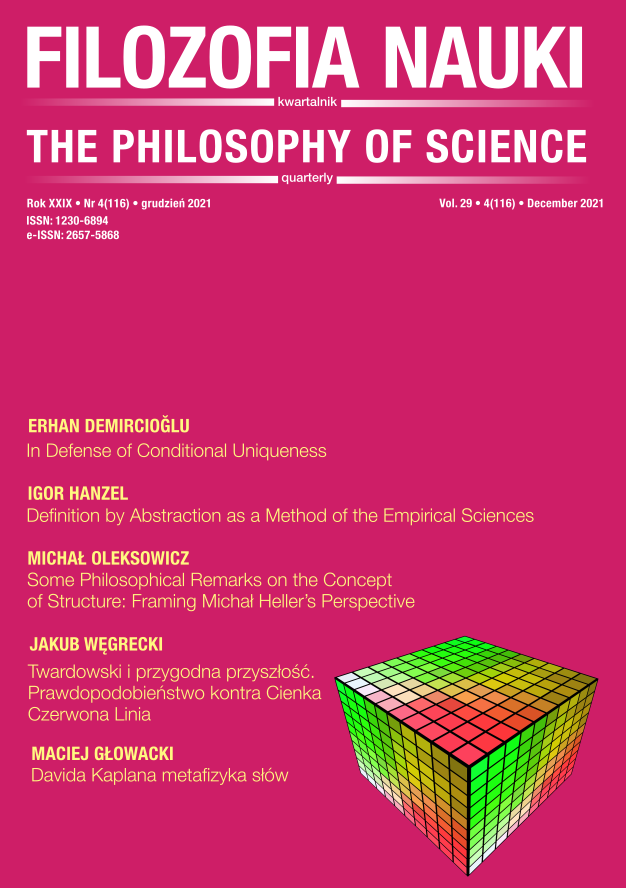Definition by Abstraction as a Method of the Empirical Sciences
DOI:
https://doi.org/10.14394/filnau.2021.0021Słowa kluczowe:
definition by abstraction, Peano, Dubislav, magnitudes, hyperintensional semanticsAbstrakt
In this paper, I analyze the structure of definition by abstraction employed in empirical sciences, whose specific feature is that it enables one to introduce a new magnitude on the basis of other, already known magnitudes. After reconstructing Aristotle’s and Archimedes’ treatment of the term “velocity,” I characterize in general terms the importance of this method for empirical sciences and address the nature of this definition drawing on Peano’s reconstruction. Next, I show that by means of that definition the magnitude mass can be introduced in classical mechanics, and the magnitude value in political economy drawing on the works of Ricardo. Then follows a critique of the nominalistic objections of Reichenbach and Dubislav against definition by abstraction. Finally, I show that this type of definition requires an in-depth semantic characterization, and this characterization should be based on the application of a hyperintensional semantic theory.
Bibliografia
Aristotle (2018), Physics, Indianapolis: Hackett.
Berka K. (1983), Measurement, Dordrecht: Reidel. https://doi.org/10.1007/978-94-009-7828-7_2
Bunge M. (1992), “Mach’s Critique of Newtonian Mechanics” [in:] Ernst Mach, J. Blackmore (ed.), Dordrecht: Kluwer, 243-261. https://doi.org/10.1007/978-94-011-2771-4_13
Carnap R. (1947), Meaning and Necessity, Chicago: The University of Chicago Press.
Dubislav W. (1929), “Über Definitionen durch Abstraktion,” Archiv für systematische Philosophie und Soziologie 32(1), 14-27.
Duží M., Jespersen B., Materna P. (2010), Procedural Semantics for Hyperintensional Logic, Dordrecht: Springer. https://doi.org/10.1007/978-90-481-8812-3
Ellis B. (1960), “Some Problems of Fundamental Measurement,” Australasian Journal of Philosophy 38(1), 37-47. https://doi.org/10.1080/00048406085200021
Frege G. (1903/1967), “Über die Grundlagen der Geometrie” [in:] Kleine Schriften, G. Frege, Hildesheim: G. Olms, 262-266.
Frege G. (1913/1983), “Logik in der Mathematik” [in:] Nachgelassene Schriften, G. Frege, Hamburg: Felix Meiner, 219-270. https://doi.org/10.28937/978-3-7873-3159-8
Glavaničová D. (2017), “Definície z pohľadu hyperintenzionálnej sémantiky” [“Definitions from the Perspective of Hyperintensional Semantics”], Filozofia 72(1), 15-23.
Jago M. (2014), The Impossible, Oxford: Oxford University Press. https://doi.org/10.1093/acprof:oso/9780198709008.003.0005
Jammer M. (1961), The Concept of Mass in Classical and Modern Physics, Cambridge, MA: Harvard University Press.
Mach E. (1901), Mechanik in ihrer Entwicklung, Leizpig: Brockhaus.
Mancosu P. (2018), “Definitions by Abstraction in the Peano School” [in:] From Arithmetic to Metaphysics, C. de Florio, A. Giordani (eds.), Berlin: De Gruyter, 261-288. https://doi.org/10.1515/9783110529494-017
Martens N. C. M. (2017), “Regularity Comparativism about Mass in Newtonian Gravity,” Philosophy of Science 84(5), 1226-1238. https://doi.org/10.1086/694086
Martens N. C. M. (2018), “Against Laplacian Reduction of Newtonian Mass to Spatiotemporal Quantities,” Foundations of Physics 48(5), 591-609. https://doi.org/10.1007/s10701-018-0149-0
Newton I. (1999), The Mathematical Principles of Natural Philosophy, Berkeley: University of California Press.
Peano G. (1888), Calcolo geometrico, Torino: Fratelli Bocca.
Peano G. (1894), Notations de logique mathématique, Turin: Charles Guadagnini.
Peano G. (1915), “Le definizioni per astrazione,” Bolletino della ‘Mathesis’ 7, 106-120.
Reichenbach H. (1947), Elements of Symbolic Logic, New York: Macmillan.
Ricardo D. (1951-1973), The Works and Correspondence of David Ricardo, Cambridge: Cambridge University Press.
Schlaudt O. (2009), Messung als konkrete Handlung, Würzburg: Königshausen und Neumann.
Schleichert H. (1966), Physikalische Semantik, Wien: R. Oldenburg.
Tichý P. (1988), The Foundations of Frege’s Logic, Berlin: De Gruyter.
Weyl H. (1949), Philosophy of Mathematics and Natural Science, Princeton: Princeton University Press.



















 Filozofia Nauki | ISSN 1230-6894 | e-ISSN 2657-5868
Filozofia Nauki | ISSN 1230-6894 | e-ISSN 2657-5868